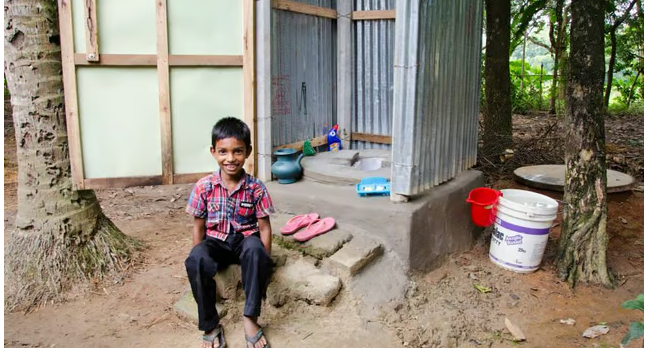Accelerating change in ensuring sanitation in Bangladesh
19 November, 2023
For as long as Mayarani remembers living in her village of Tanore Upazila of Rajshahi District, her five-member family always used a pit-latrine made of sack burlap located at the outside of the household. One of the most essential amenities, the toilet, took a good three-minute walk to reach, situated in a nearby rice-field. Accessing this toilet, particularly during night-time, was a very uncomfortable ordeal not only for the mother-in-law and daughter-in-law duo, but also for her 15-year-old granddaughter and seven-year-old grandson.
Unlike the conventional narrative of mother-in-law and daughter-in-law being at loggerheads with each-other, Mayarani, a hard-working Santal woman in her 50s, shares a significantly positive relationship with her daughter-in-law Promila and is incredibly proud of her recent contribution in changing the sanitation situation of their household.
Frustrated by the condition, Promila would often discuss with her husband about building an improved latrine in their premises. But their conversation would typically end abruptly as their meagre income from farming does not leave room for the installation cost.
Amidst this condition, Promila was approached by a BRAC staff at the beginning of this year, who informed her about the opportunity to take out a sanitation loan to build a safely managed latrine. She quickly decided to take out the loan and promptly sold a cow to finance the remaining amount, without any hesitation.
By the middle of this year, Promila’s initiative allowed her family to own a semi-concrete improved latrine inside their house for the very first-time. Now, going to the toilet is no longer a physically and emotionally draining experience for the women of this family.
This narrative is just one among the myriad stories illustrating the transformation occurring in Bangladesh's sanitation sector, spearheaded by BRAC, the world's largest development organisation. However, there is a pressing need to expedite this transformation happening on the ground to achieve the Sustainable Development Goal 6 and hence this year’s theme of ‘World Toilet Day’ observed on Nov 19 is ‘Accelerating Change’.
Bangladesh has made remarkable progress in ensuring access to basic sanitation coverage. Over the last two decades, open defecation has decreased from 34 percent to nearly zero, and possessing a toilet has become a status symbol. Yet, according to JMP estimates for 2020, 75.4 million people in Bangladesh still do not have a decent toilet of their own. Furthermore, climate change impacts such as flood, drought and rising sea levels are projected to further jeopardise the functionality of the existing sanitation systems i.e., toilets, septic tanks.
The government launched a national campaign to do this and BRAC supported the efforts by taking the campaign to the community level, through community mobilisation and forming community-level WASH committees.
However, as the only organisation born and proven in the global south, our approach compels us to take the saying, “If you give a man a fish, you feed him for a day. If you teach a man to fish, you feed him for a lifetime” very seriously. So, this was supported by activating market forces - starting rural sanitation centres which sold sanitary construction materials and supporting people to become sanitation entrepreneurs. Rather than simply providing materials, the programme offers loans to individuals from local communities in order for them to establish sanitation enterprises. More than 3,000 sanitation entrepreneurs have been trained in both safe latrine manufacturing procedures and entrepreneurship.The work grew to become the largest WASH programme anywhere managed by an NGO and 39 million people received access to hygienic sanitation in 250 sub-districts of Bangladesh.
As per the United Nations, with just seven years left, the world has to work, on average, five times faster to meet the sanitation target of SDG 6 -- ‘Ensure access to water and sanitation for all’-- by 2030 on time. In order to overcome challenges to establish sustainable sanitation systems with limited resources in Bangladesh as well as globally, an accelerated and innovative effort is required more than ever before.
Financing sanitation infrastructure through WASH loans can be an effective way forward for providing affordable sanitation to low-income households while creating a stable source of income. While the importance of public sector investment in large-scale sanitation systems remains critical for achieving SDGs in Bangladesh, availability of WASH loans by organisations such as BRAC will enable thousands of individuals like Promila, who might otherwise be unable to invest a substantial amount upfront, to afford decent and hygienic toilets.
At a time when many are questioning the likelihood of achieving the Sustainable Development Goal for sanitation, BRAC is showcasing that it is possible to not only deliver at scale and with equity, but also to come up with different financing pathways for WASH.


No comment yet.